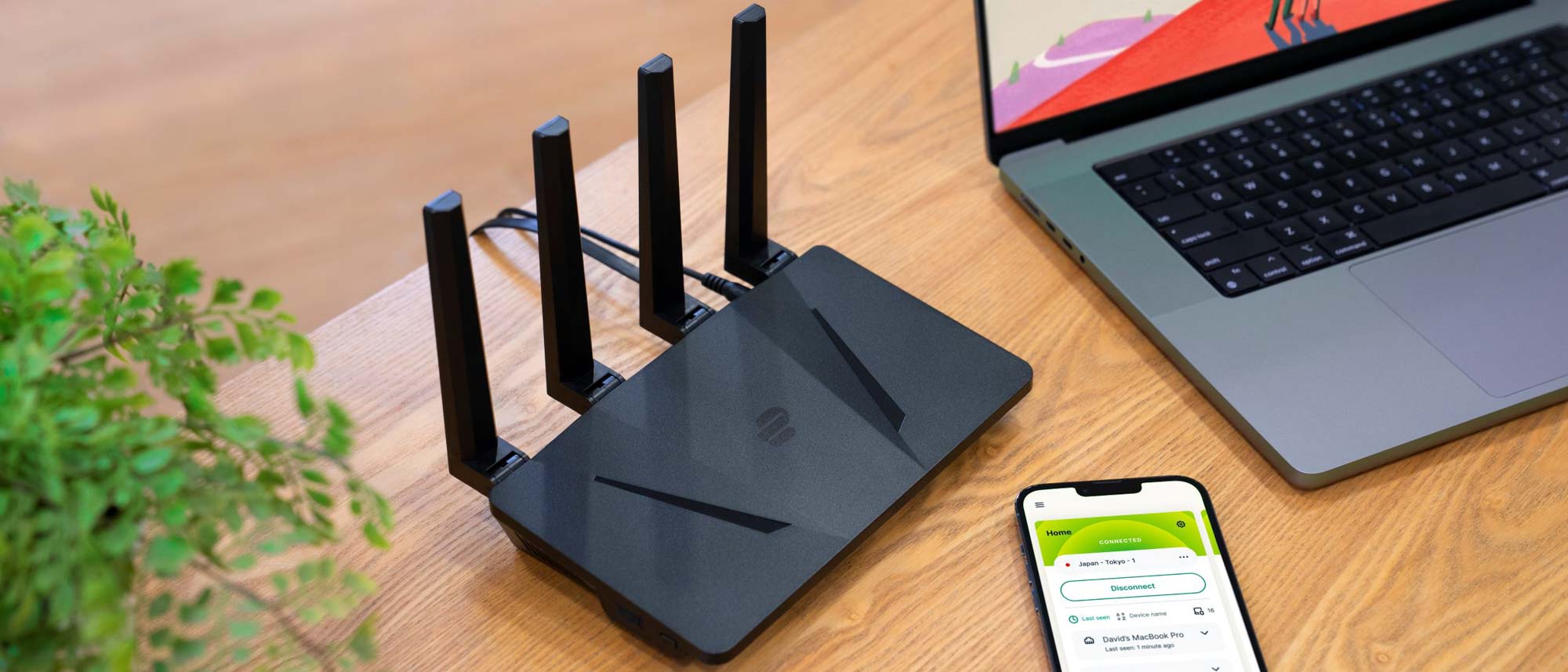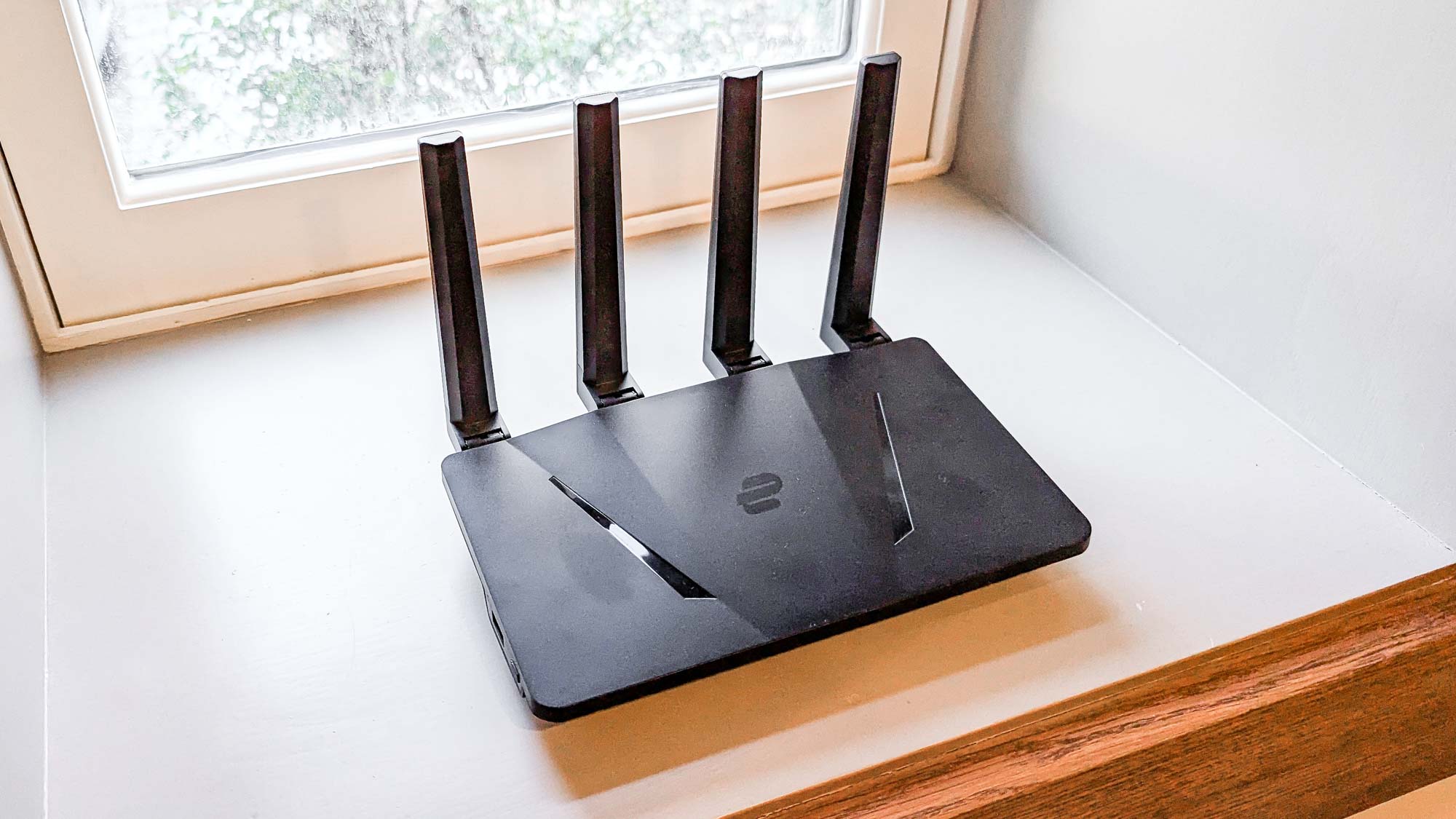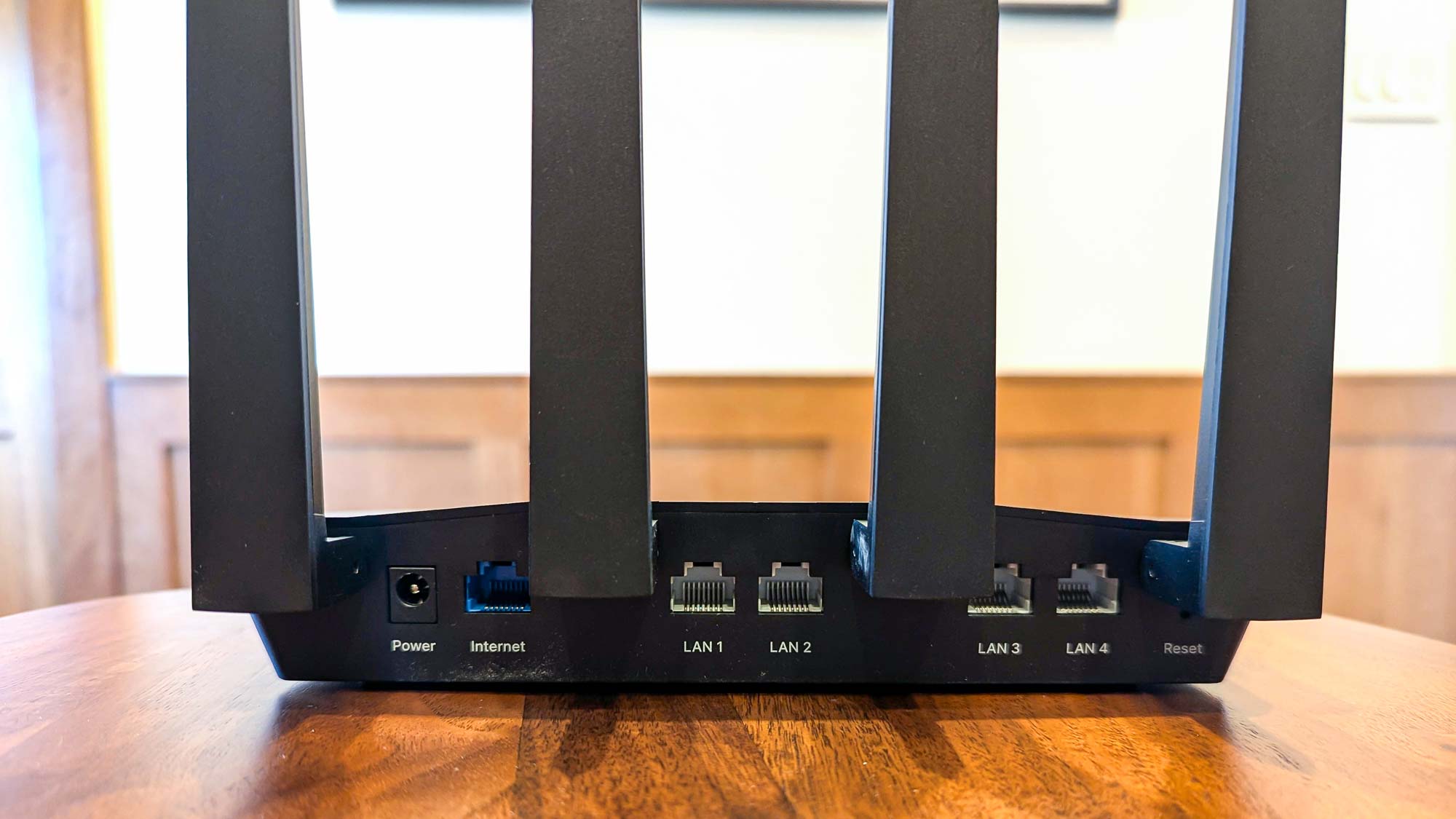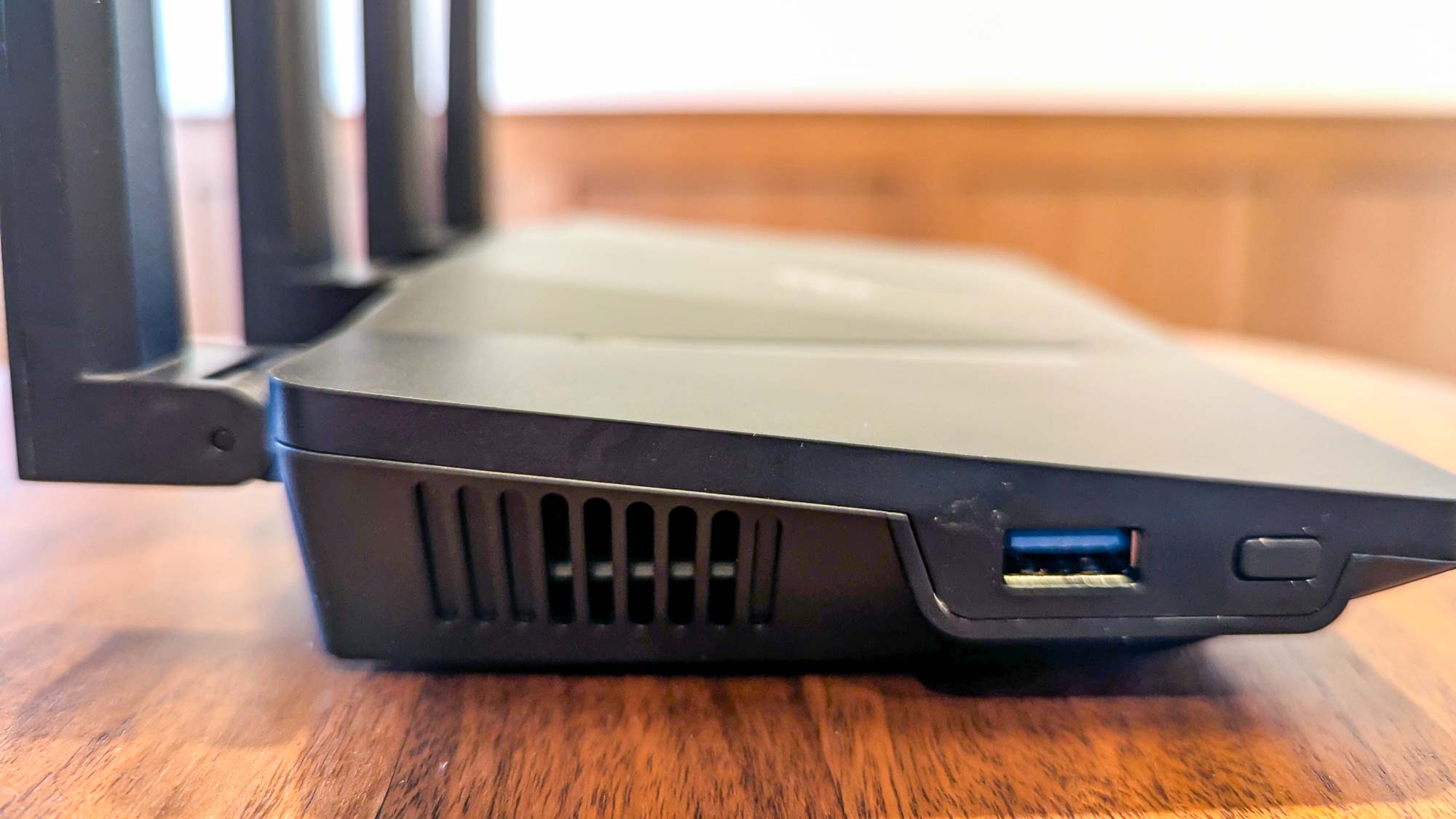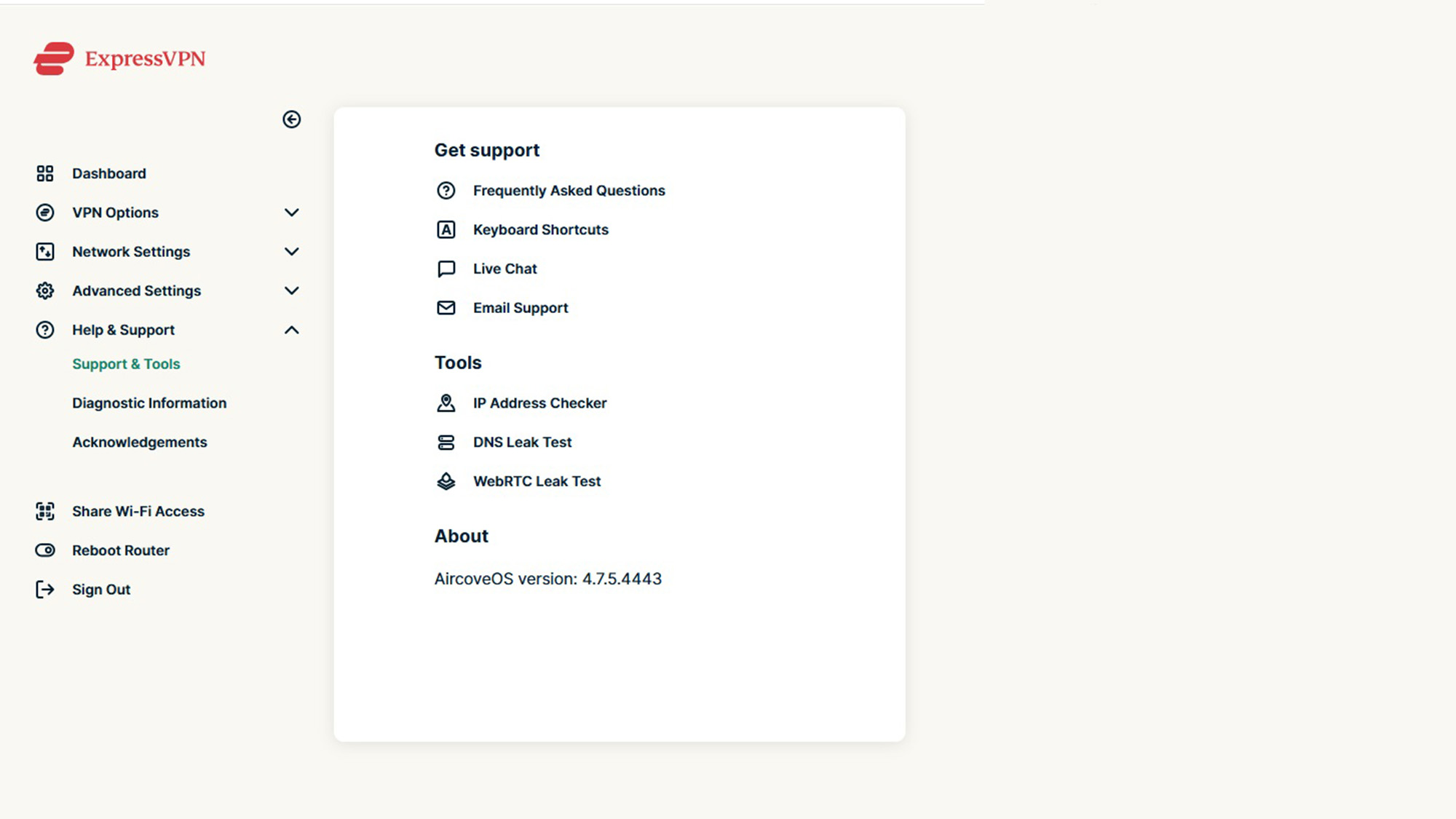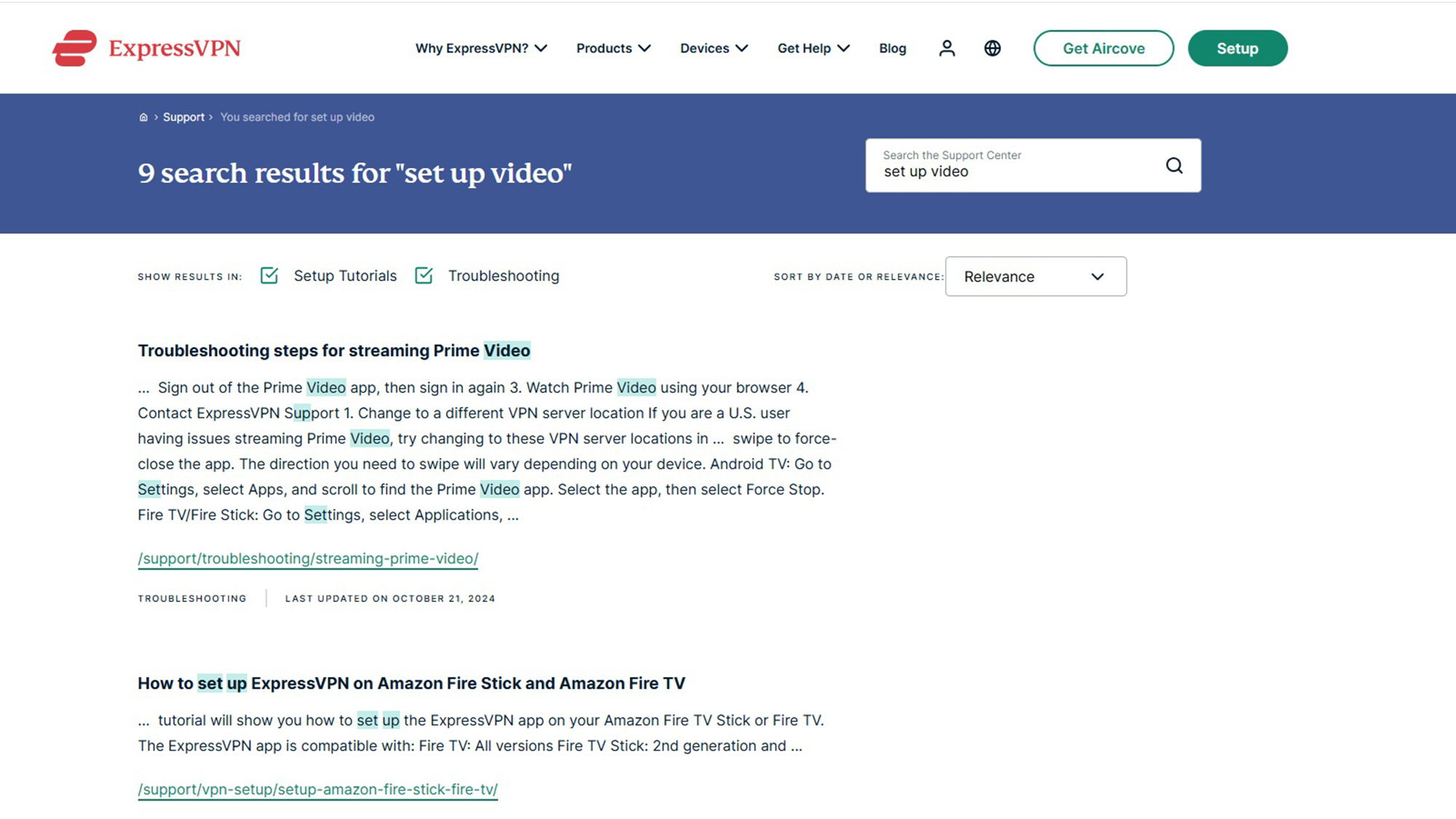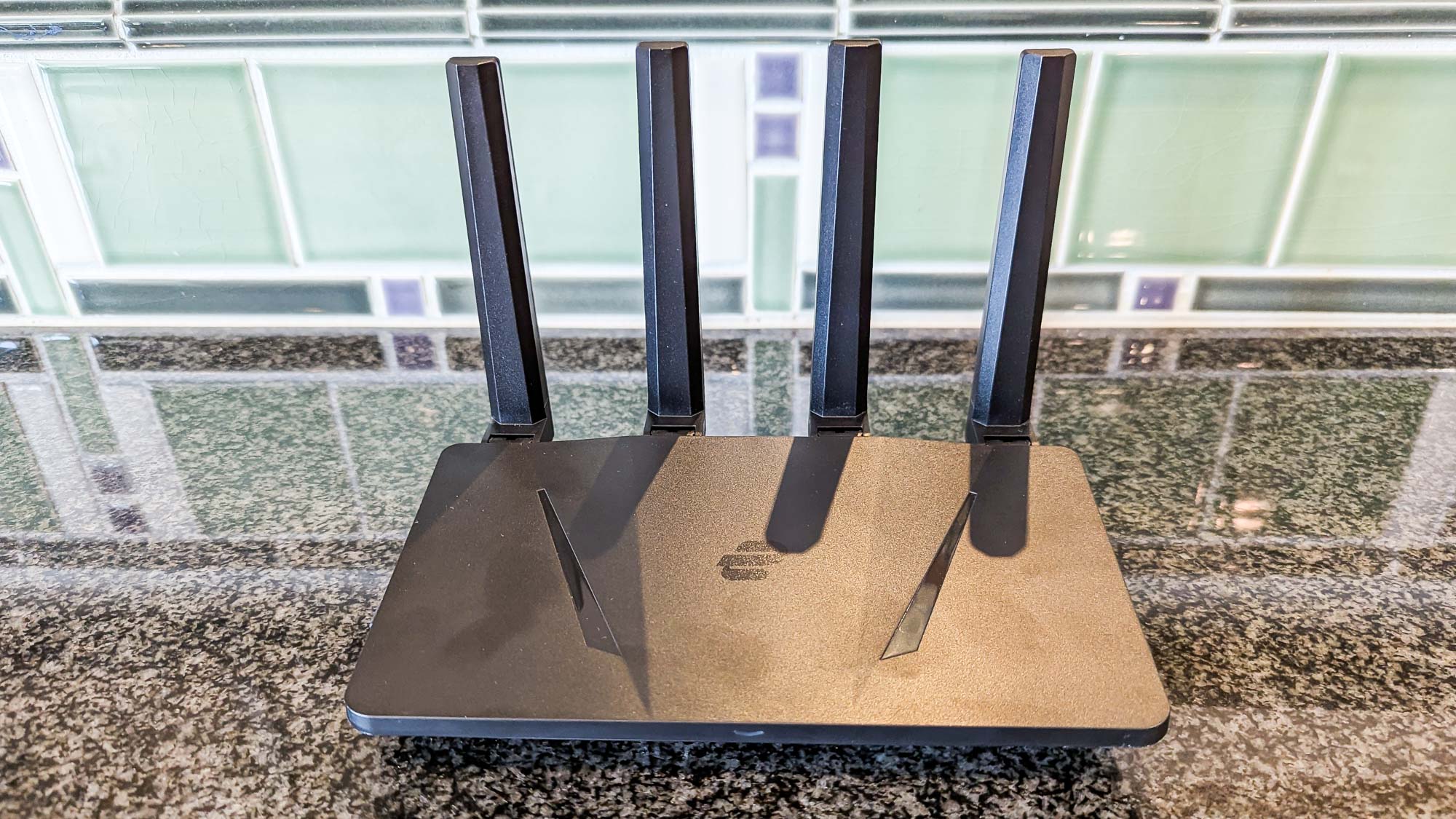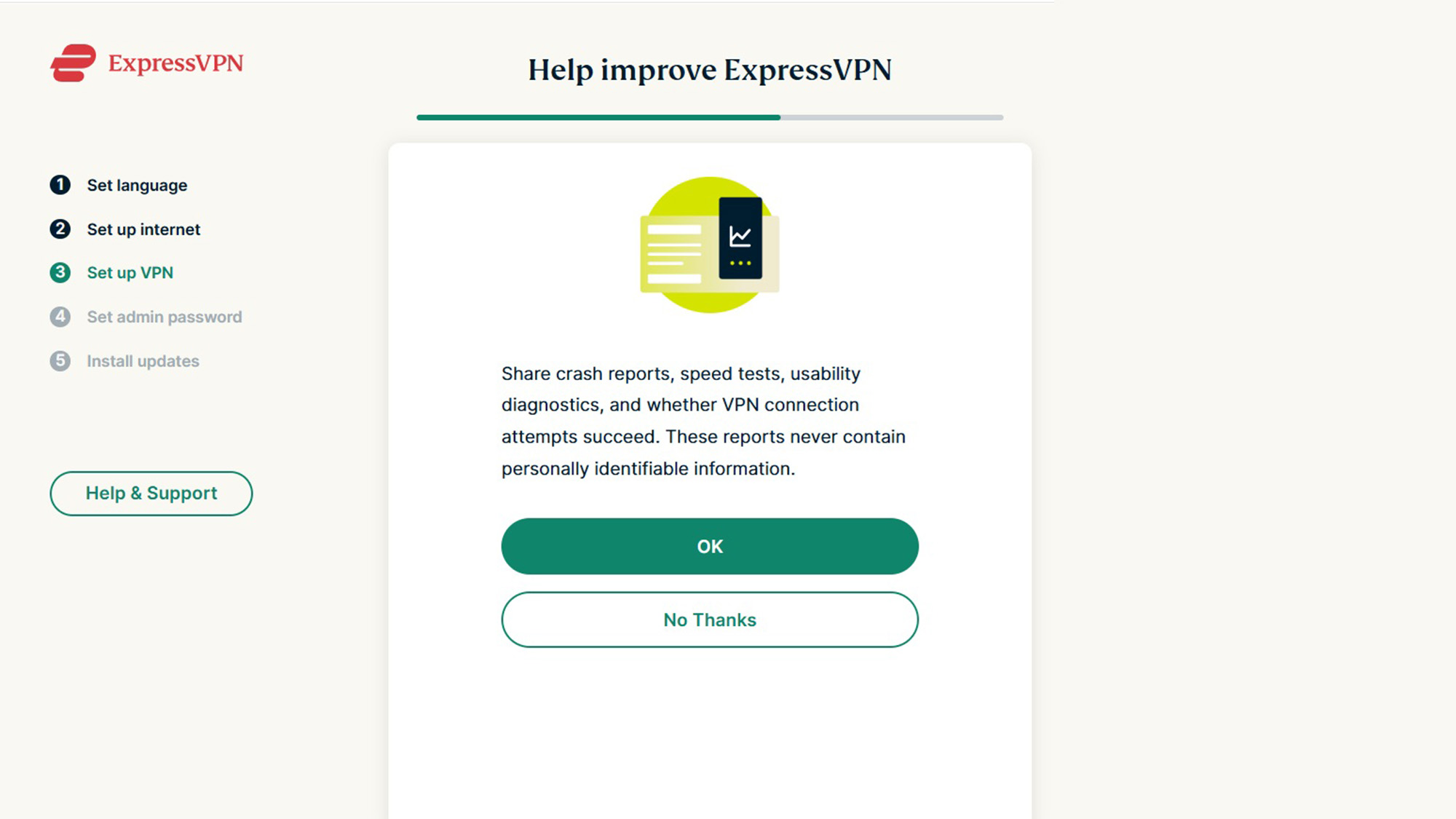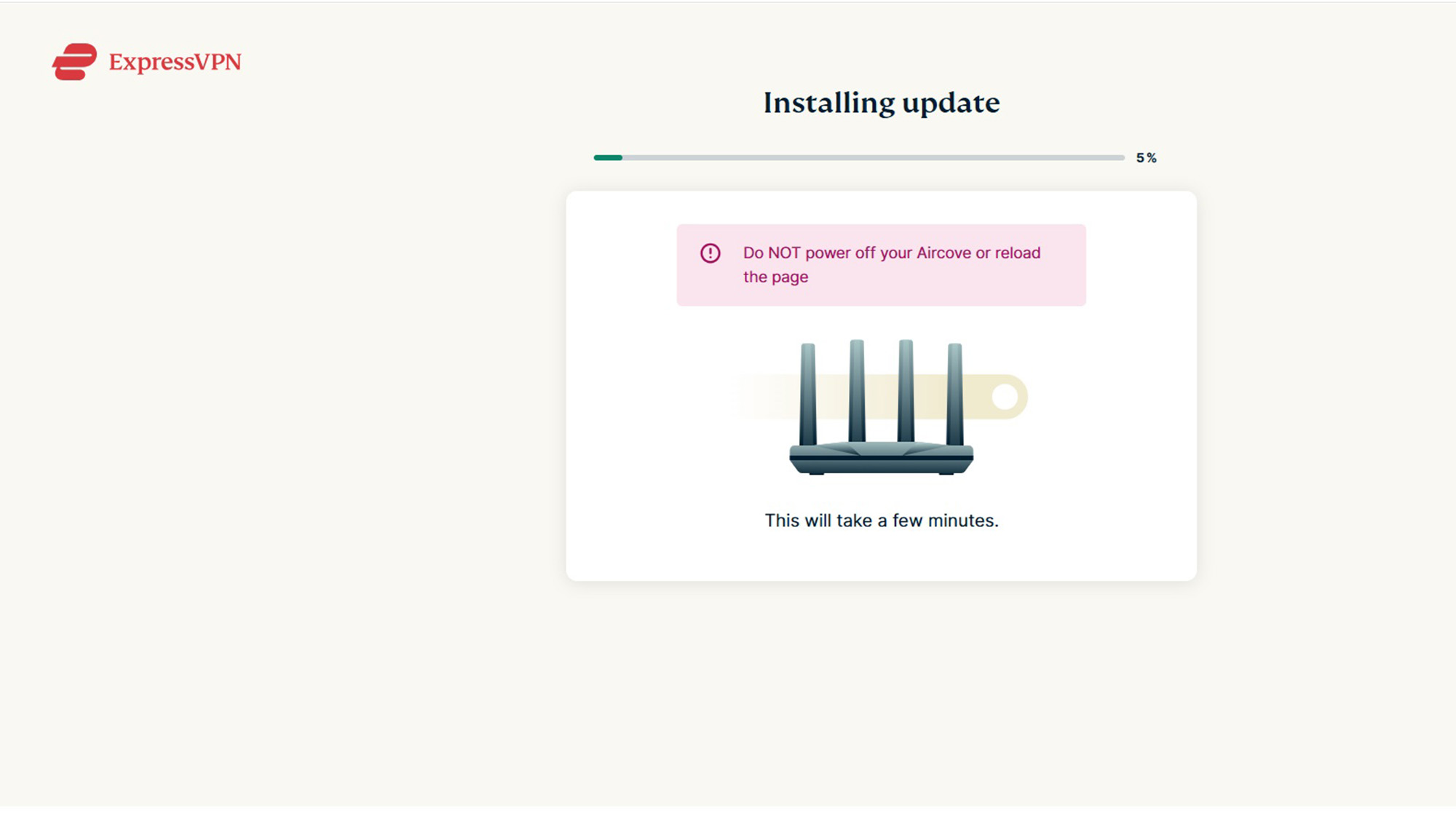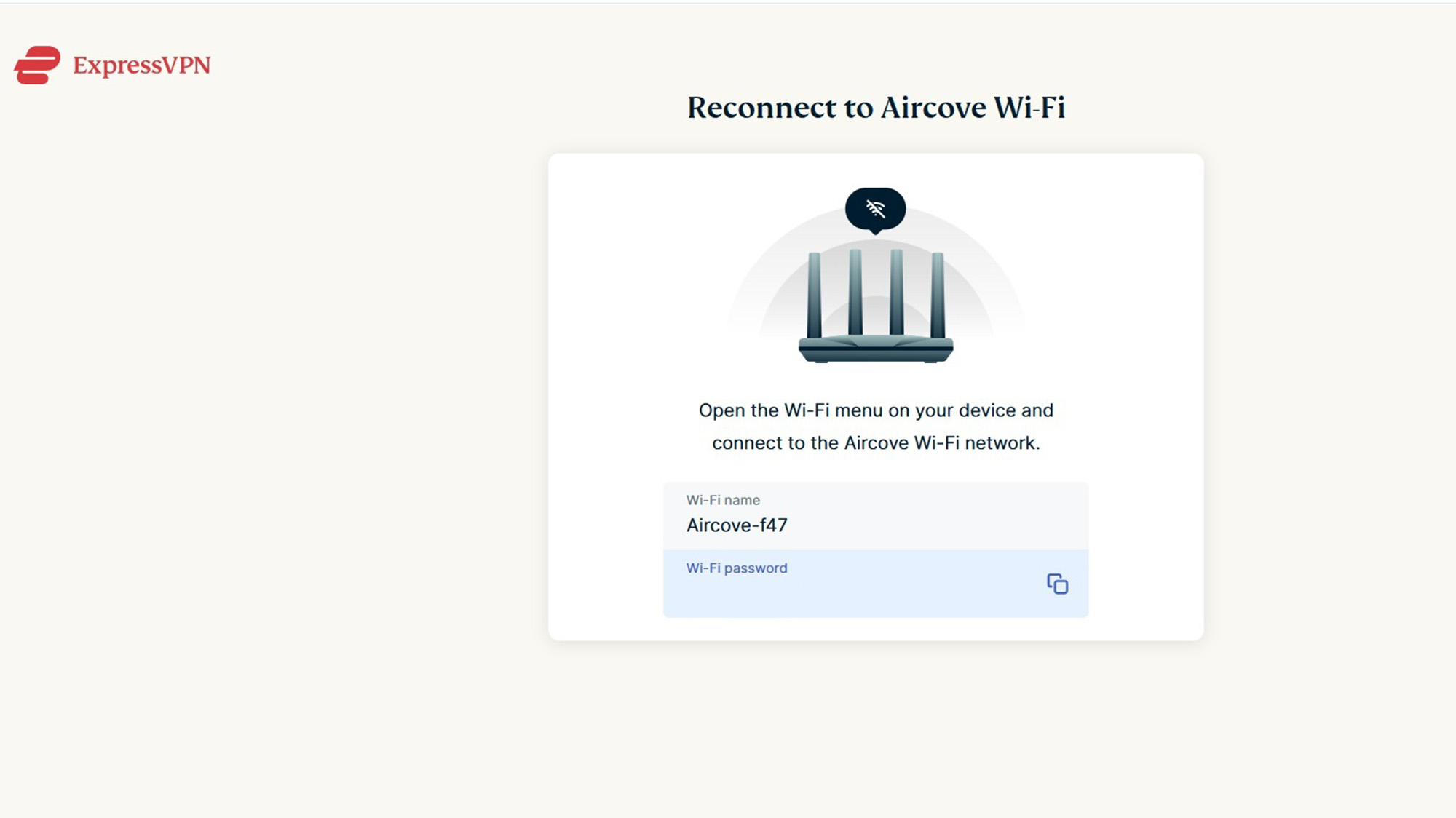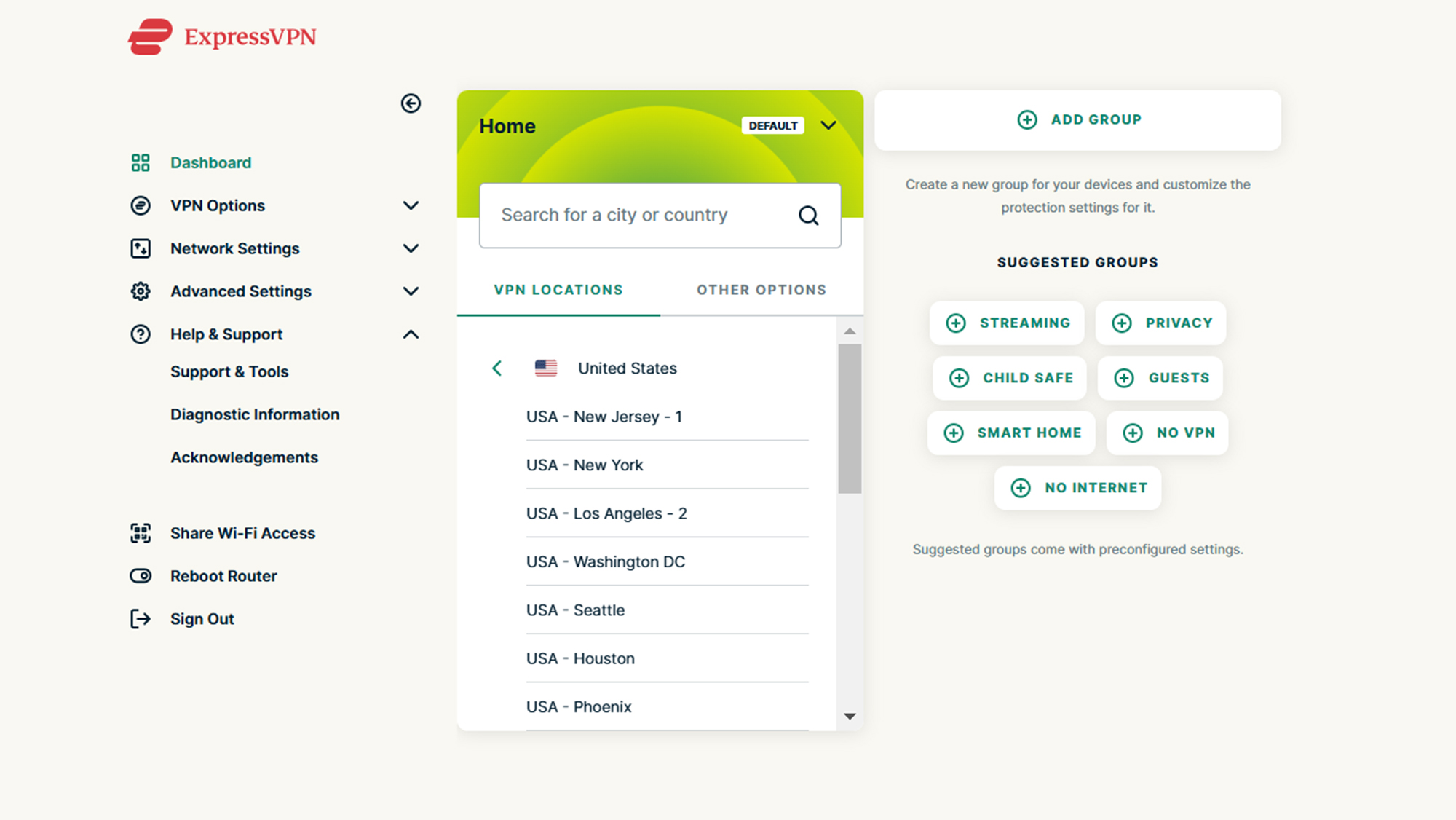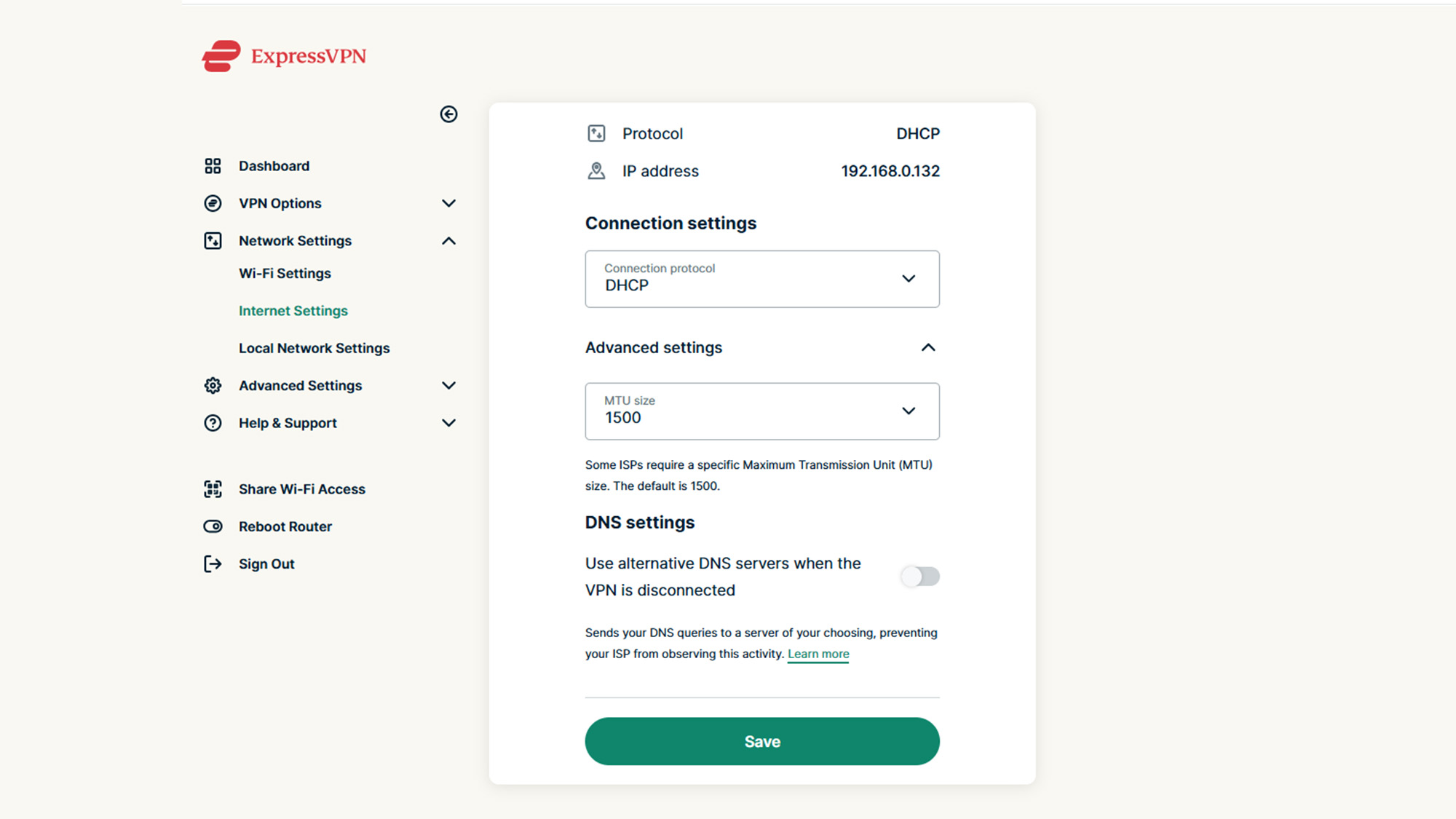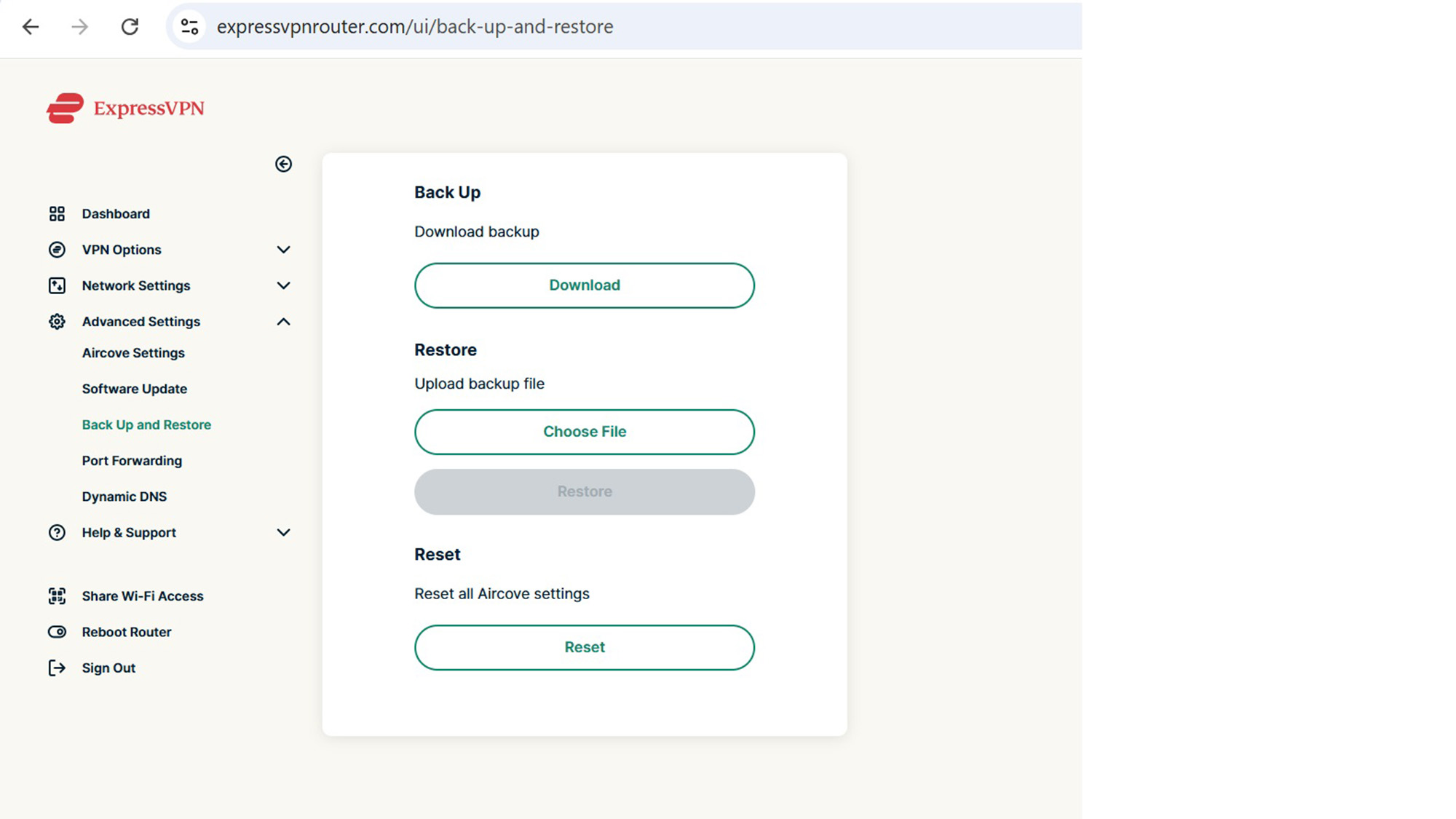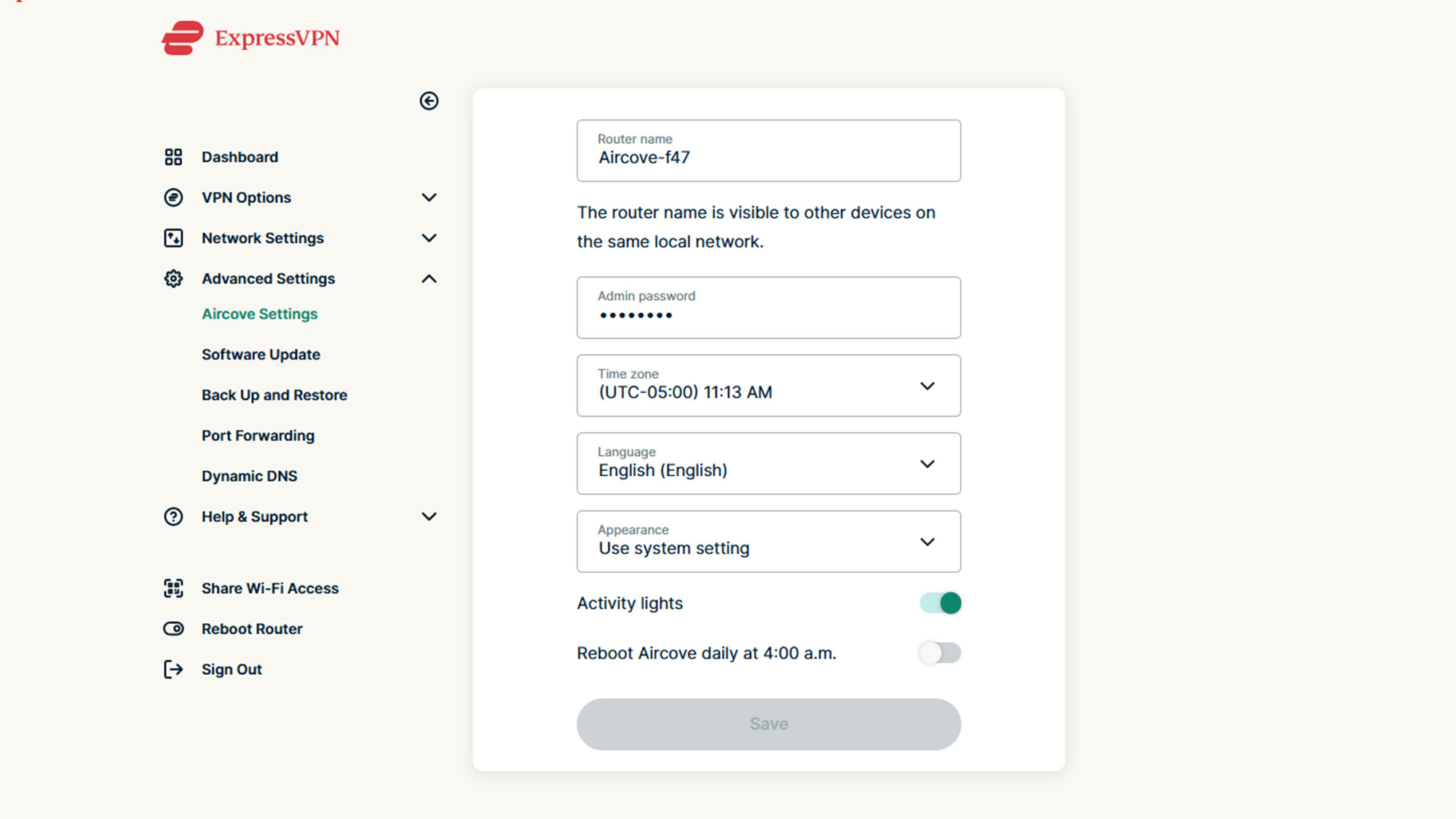Tom's Guide Verdict
With ExpressVPN’s Aircove router it’s easy to go on a global streaming trip while upping home networking security because its Virtual Private Network can be set to connection points in over 100 countries. Unfortunately, you’ll need to pay for a VPN subscription to make the most of it.
Pros
- +
Small and easy to hide
- +
VPN for all connected devices
- +
Blocks ads and online threats
- +
Apps cover router and popular platforms
- +
Bonus ID insurance with annual plan
Cons
- -
No malware scanning
- -
Lacks setup and configuration app
Why you can trust Tom's Guide
Wi-Fi Spec: AX1800 (802.11AX)
Antennas (removable): 4/No
Ports: 1 WAN/4 LAN gigabit per second
Processor/Memory/Storage: 1.2GHz quad-core/512MB/128MB
Wi-Fi chip: Qualcomm IPQ6000
Peak 802.11AX Performance: 788.3 Mbps (at 15 feet)
Range: 105 feet
Size: 8.3 x 5.9 x 1.4 inches
Est. Annual Electricity Cost: $8.70
It may not be the cheapest or fastest router available today, but one thing is certain, ExpressVPN’s Aircove is one of the most secure home networking devices available. With built-in links to the company’s Virtual Private Network (VPN) service, it can connect globally to stream programming from just about anywhere while keeping your data and online identity safe at home.
Getting the most out of Aircove, however, requires a $100 a year ExpressVPN subscription that includes ID insurance and monthly credit reports as well as ad and malware blockers.
It’s certainly a good choice for the security minded among us, but can the Aircove compete with the best when it comes to doling out data?
ExpressVPN Aircove review: Pricing and availability
Priced at $190, ExpressVPN’s Aircove router is $10 more than the similar Privacy Hero 2 VPN router, which includes a year of VPN service, not the Aircove’s month. It’s also pricey compared to conventional Wi-Fi 6 routers, like the $80 TP-Link Archer AX55 or the $130 Reyee RG-E5. The company also has a mobile Air Cove Go router that sells for $170.
ExpressVPN Aircove Review: Design
Small and unobtrusive, the Aircove router has a sophisticated matte black finish and an angular look. At 8.3 x 5.9 x 1.4 inches, it’s not only about 40% smaller than the already tiny TP-Link Archer AX55 but only about the size of a thick paperback book. When folded up, the router’s four antennas add 4.6 inches to its height.
Its AC adapter is equally small and comes with four plugs to cover many of the world’s outlets. Once powered up, the Aircove’s LED glows blue when it’s online like a small smile. It blinks white when the router is offline.
Passively cooled, Aircove has vents underneath and on its sides. It topped out at a temperature of 97.6 degrees Fahrenheit. There’re soft silicone feet and inserts underneath to wall mount it.
Get instant access to breaking news, the hottest reviews, great deals and helpful tips.
Powered by Qualcomm’s IPQ6000 Wi-Fi chipset, the dual-band Aircove router uses Wi-Fi 6 2X2 data streaming over each band. Its AirCoveOS software is powered by a 1.2GHz quad-core processor and 512MB of RAM with 128MB of flash storage for its firmware and settings. The router tops out at maximum speeds of 600 Mbps for the 2.4GHz band and 1.2 Gbps for the 5.0GHz band. Its AX1800 rating is a step or two behind the Archer AX55’s AX3000 spec and can’t tap into the 6GHz band that Wi-Fi 6E and Wi-Fi 7 routers can.
Other than that, it combines the best of Wi-Fi 6’s protocol, including 1K Quadrature Amplitude Modulation (QAM), MUMIMO and beamforming for customizing its data transmissions to its recipient. Its Orthogonal Frequency Division Multiple Access (OFDMA) spectrum sharing allows multiple high-speed connections.
The device’s back has a WAN input and four wired downstream networking ports that top out at 1 Gbps peak speeds. Next to its reset button, the Aircove has a curious USB port hidden by a rubber boot that can neither charge a phone nor connect a data drive to the router’s network. It might be for a future upgrade.
Aircove protects in two ways, starting with any device connected to its network because all the router’s data traffic – in and out – goes through the VPN. Plus, there’re a variety of apps for the most popular platforms for standalone VPN use from Windows, Mac, Chromebook and Linux to iOS, Android and Amazon Fire to several gaming and streaming consoles. To make the most of it, you’ll need an ExpressVPN subscription that allows Aircove plus any other seven app-connected systems to be VPN protected at a time. It can be a big deal when traveling or working from a café.
Aircove includes a 30-day VPN subscription, which pales next to Privacy Hero 2’s full year of included NordVPN service. After that, the Aircove’s VPN costs $12.95 a month for basic service, but the $100 annual plan (actually 15 months) is a bargain with monthly credit reports, $1 million in ID insurance and ExpressVPN’s password manager; there’s also a $140 plan for 28 months that amounts to $5 a month, about the cost of a fancy cup of coffee. The company’s newest addition is a one-time 5GB eSIM account with Holiday.com for a mobile device. You can pay with plastic, Bitcoin or PayPal.
The router’s 1 year warranty and lifetime support is a lot better than Netgear’s 90 days of personalized support after which you have to pay upwards of $100 a year. Aircove is the rare router that has a direct link to the product’s help pages. There’re also three hidden gems: an IP address checker as well as DNS and WebRTC leak testers.
ExpressVPN has lots of online self-serve items like setup help, how to check the router’s status and assistance with VPN connections. There’s a 24/7 chat window that’s staffed with humans but no traditional user manual to read up on its capabilities and methods.
ExpressVPN Aircove review: Security
Raw speed misses Aircove’s privacy focus and its ExpressVPN Virtual Private Network service. Others allow the router to be set up as a VPN server or client but making it work can be a hit and mostly miss proposition. With Aircove it’s all set up and only requires registration.
ExpressVPN’s geographic scope is good with servers in 105 countries, from Argentina to Vietnam although NordVPN covers 117 countries, including Angola. The Aircove uses ExpressVPN’s Lightway protocol but the app allows switching to IKEv2 or OpenVPN. Either way, the company’s servers offer 256-bit AES encrypted secure tunnelling, a kill switch and the company’s Domain Name Servers (DNS) close the loop; ExpressVPN promises not to share or sell this data.
The Network Lock keeps you from insecurely moving to a new webpage if the VPN connection is interrupted, making it perfect for use with inherently insecure public Wi-Fi. Like eero’s networking products, the Aircove can’t use the Wi-Fi Protected Setup (WPS) option to quickly add devices to a network. It can be a major vulnerability, although the majority of the home networking world continues to offer it.
All of Aircove’s transactions occur in the server’s memory, so there’re no logs or leave-behind data. Plus, based in the British Virgin Islands, ExpressVPN is beyond the long arm of law for snoops from the Five Eyes countries (Australia, New Zealand, United States, United Kingdom and Canada). This means your data and where you’ve spent your time online are safe from prying eyes.
While it lacks the antivirus scanning software that comes with Netgear’s Armor, ExpressVPN makes up for it with router level malware protection, an ad blocker and parental controls. Its router and client firmware is updated monthly and requires the correct digital signature to be installed.
While the focus is on online security, Aircove’s VPN access allows tunneling to just about any foreign country to grab media that’s not available in the U.S., like “Plan 75” or “Fisk”. That said, the router supports up to five groups that can have the data emerge in a specific country or city.
ExpressVPN Aircove Review: Performance
A competent Wi-Fi 6 router, Aircove should be more than enough for most, but lacks access to the high-performance 6GHz networking band. Its antennas deliver a horizontal ellipsoid shaped transmission pattern that might be better for a single floor going up or down a story.
Using networking benchmark software from Keysight IxChariot set to mimic 10 data hungry users and the Aircove’s VPN connection turned off, the Acer Swift 16 Edge system recorded a close up throughput of 869.5 Mbps. That improved to 1.843 Gbps with 15 feet of Cat 6 cabling.
At the real-world distance of 15 feet, the router’s throughput dropped to 788.3 Mbps. That’s less than 10% behind the class-leading Reyee RG-E5’s 849.2 Mbps or TP-Link Archer X55’s 823.7 Mbps.
With 50 feet between the Aircove and test system, the router delivered 419.7 Mbps of data, perfect for a sub gigabit per second data plan. It offers a speed boost over the Linksys MR9600’s 363.3 Mbps and the Archer AX55’s 288.4 Mbps.
| Row 0 - Cell 0 | ExpressVPN Aircove | TP-Link Archer AX55 | Reyee RG-E5 | Linksys MR9600 |
15 feet | 788.3 Mbps | 823.7 Mbps | 849.2 Mbps | 822.0 Mbps |
50 feet | 419.7 Mbps | 288.4 Mbps | 240.1 Mbps | 363.3 Mbps |
75 feet | 216.8 Mbps | 89.6 Mbps | 298.0 Mbps | 227.0 Mbps |
90 feet | 15.7 Mbps | 15.0 Mbps | 45.8 Mbps | Offline |
At a distance of 75 feet, the Aircove’s 216.8 Mbps was just off the pace of the resurgent RG-E5’s 298.0 Mbps. It blew away the lagging Archer AX55’s 89.6 Mbps. The Aircove pushed 15.7 Mbps at our terminal test distance of 90 feet, well off the RG-E5’s 45.8 Mbps. At the same distance the MR9600 was out of range. The Aircove had a range of 105-feet and was able to blast 661.4 Mbps across a 25 foot room and through a wall.
Using the Automatic VPN protocol setting, it took an average of 2.6 seconds to establish a secure link with an ExpressVPN server in New York. My unfettered 338.2 Mbps connection dropped roughly in half to 176.9 Mbps of secure throughput. More to the point, the connection’s average latency grew by 2 milliseconds to 16.7ms. Manually changing this to Lightway TCP, the throughput rose about 20 Mbps to an average of 195.9 Mbps, making it the one to use for me.
With or without a VPN connection, the Aircove easily passed our saturation test where several connected devices play a variety of media. While my iPad viewed videos and a Galaxy Book played the BBC World Service news feed, a MacBook had 4K videos playing. As all these bytes were flying back and forth, my Acer Swift 16 Edge moved data onto and off of a network RAID server. There were no glitches, freeze ups or anomalies as everything came through loud and clear.
During the benchmarking stress test, the Aircove used all of 6.2 watts, making it more efficient than the Archer AX55’s 8.4 watts. It should cost roughly $8.70 a year to use if left on 24/7 and you pay the national average of 16 cents per kilowatt hour of electricity.
ExpressVPN Aircove Review: Setup
Even with subscribing to ExpressVPN’s service, getting the Aircove installed and set up was surprisingly easy. I started by plugging everything in and connecting my Galaxy Book notebook to the router’s default network; the passcode is printed underneath. The “Hello” welcome screen wanted me to pick my favorite language.
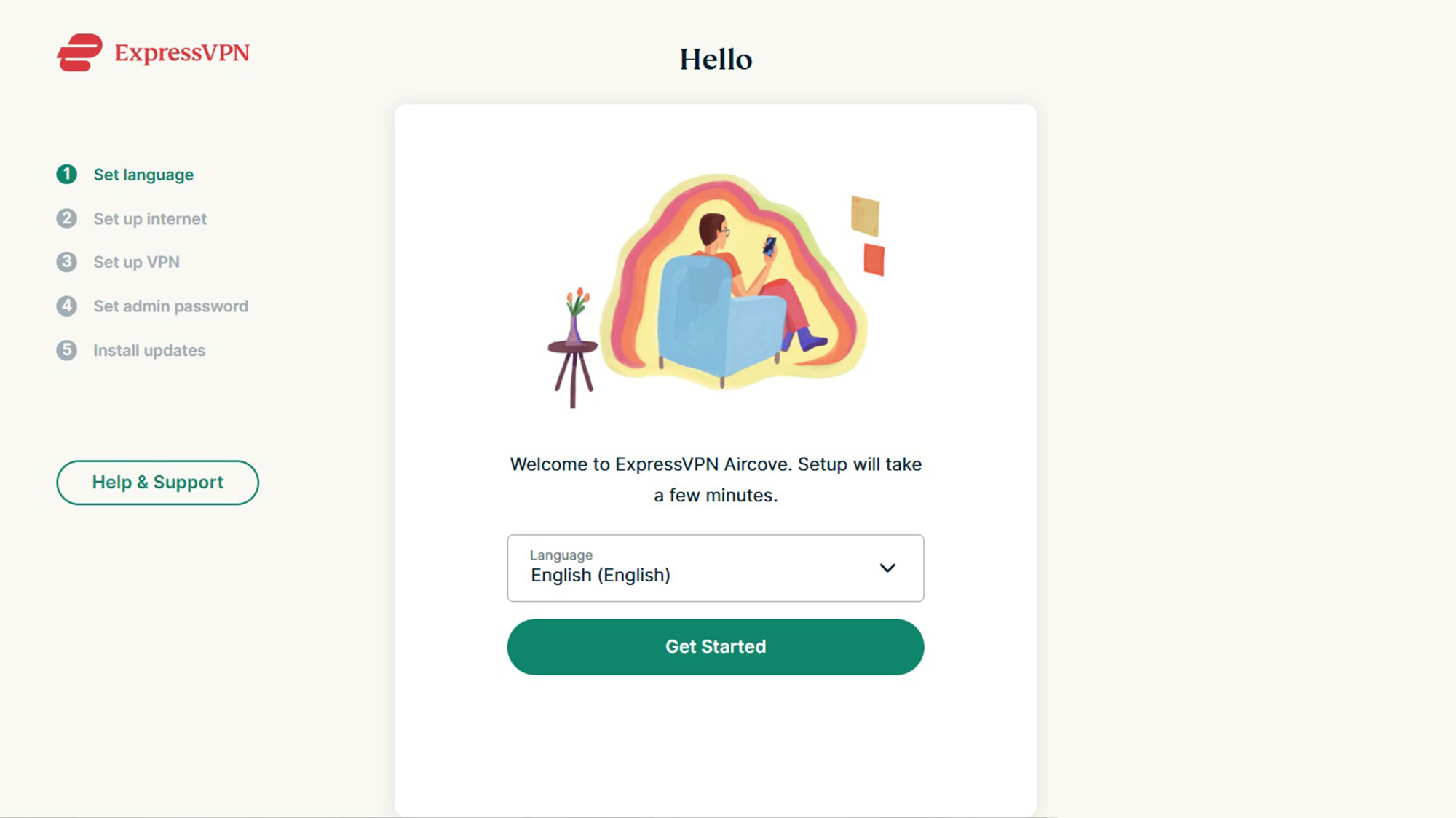
Next, I typed “expressvpnrouter.com” into the browser’s address bar to start the installation; 192.168.132.1 works just as well. I declined to share my data with them to improve the service.
Next up, the router connected to ExpressVPN with the choice of a 30-day trial or creating an account. I set up a year’s worth of service, followed by creating an admin password. The router updated itself.
My Galaxy S25 phone connected on the first try but it still had the router’s default connection details, which I quickly changed. The final screen shows the network’s log in credentials. All done in 11 minutes.
Express VPN Aircove Review: Configuration
The Aircove’s browser-based Dashboard focuses on simplicity. The VPN status is up front and connected systems listed below. On the right are thoughtful suggestions for adding connection groups and other items. On the left are tabs for a variety of options.
In addition to being able to change the network name and passcode there’s a place to change the VPN protocol. I started at Automatic and then tried Lightway TCP.
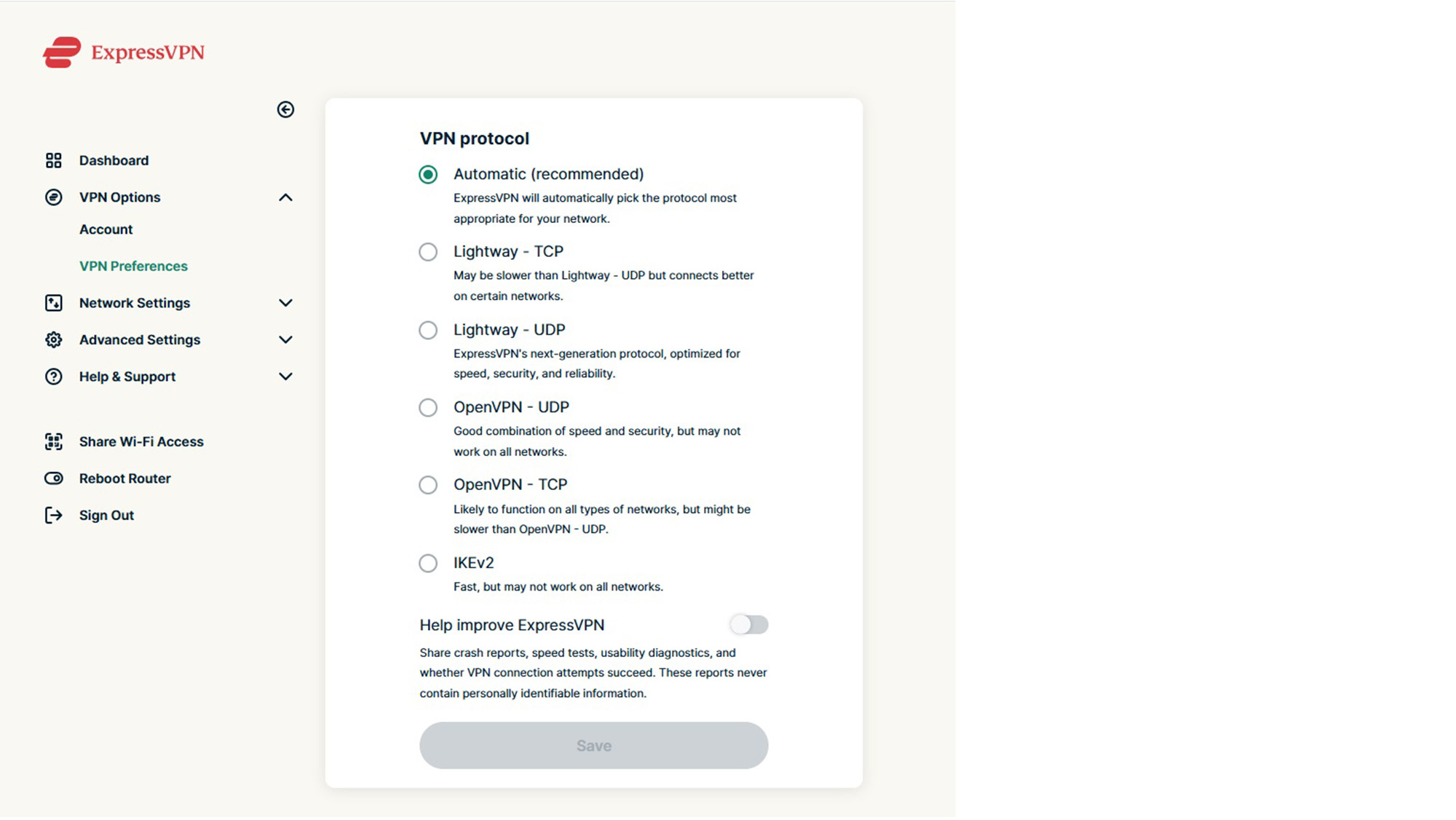
Other than light and dark interfaces, there’re not a lot of optimization choices, although the Maximum Transmission Unit (MTU) can be adjusted. It’s easy to use different DNS connections when not VPN-connected.
As soon as you find a configuration that works, it can be saved in case you encounter problems later on.
In addition to nightly firmware checks and restarts, it’s easy to turn the LED status light off. There’s no way to schedule it, though.
ExpressVPN Aircove Review: Verdict
Regardless of whether you care more about online security and privacy or going on a worldwide streaming tour, ExpressVPN’s Aircove router can do the trick. It may not be the fastest at moving data, but its VPN link, ad blocker and malware protection make the Aircove a security bull’s eye. Its ability to safely tunnel to over 100 countries make it an international entertainment hit.
Its oddities, like an unconnected USB port aside, the Aircove is a well-designed Wi-Fi 6 router with an extra layer of household online security. The $100 annual subscription not only secures the router with access to ExpressVPN’s network for more than a year, but it provides lots of added goodies, like a 5GB mobile device eSIM account.
If your top three online concerns are security, privacy and preserving an online identity, the ExpressVPN Aircove is the Wi-Fi 6 router to get. At $190, it’s a bit steep compared to less secure Wi-Fi 6 routers, but it’s worth it as much for security as for the online peace of mind it can provide.
Brian Nadel is a freelance writer and editor who specializes in technology reporting and reviewing. He works out of the suburban New York City area and has covered topics from nuclear power plants and Wi-Fi routers to cars and tablets. The former editor-in-chief of Mobile Computing and Communications, Nadel is the recipient of the TransPacific Writing Award.
You must confirm your public display name before commenting
Please logout and then login again, you will then be prompted to enter your display name.
